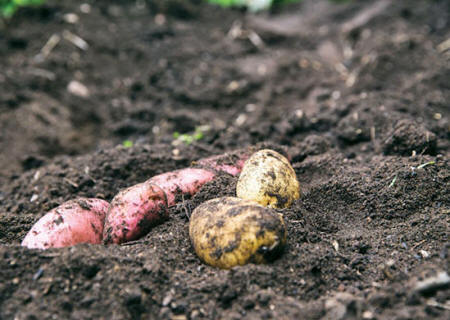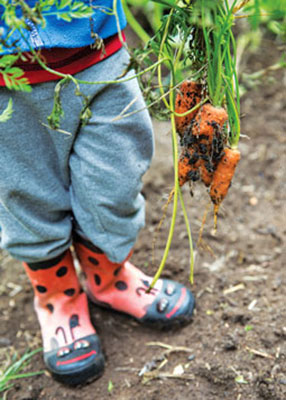|
December 6, 2013
from
YesMagazine Website
A doctor discovers exposure to healthy farm soil
holds keys to healthy
bodies.
Iím even beginning to wonder whether Hippocrates was wrong, or at least somewhat misguided, when he proclaimed,
Donít get me wrong - food is important
to our health. But it might be the soil where our food is grown,
rather than the food itself, that offers us the real medicine.
Enter the terms "soil" and "health" into a PubMed database and the top search results portray soil as a risky substance, filled with pathogenic yeast, antibiotic-resistant bacteria, radon, heavy metals, and pesticides. But move past these grim reports, and you will uncover a small, but growing, collection of research that paints soil in a very different light.
These studies suggest that soil, or at
least some types of soil, can be beneficial to our health.
Of course, this makes sense when you
understand that it is the cooperation between bacteria, fungi, and
plantsí roots (collectively referred to as the rhizosphere) that is
responsible for transferring carbon and nutrients from the soil to
the plant - and eventually to our plates.
Ecological farming (or eco-farming, as my farmer friends call it) includes many systems (biodynamic, regenerative, permaculture, full-cycle, etc.) that share core holistic tenets:
Much of this research supports what traditional farmers around the world have long known to be true: the more ecologically we farm, the more nutrients we harvest.
Why is it that children raised on ecologically managed farms in Central Europe have much lower rates of allergy and asthma than urban children or those raised on industrialized farms?
Once again, almost everything points to
microbes - in manure, in unpasteurized milk, in stable dust, on
unwashed food and, yes, in the soil. In one study, researchers
cultured farm childrenís mattresses and found a potpourri of
bacteria - most of which are typically found in soil.
The problem with this theory is that our immune system is surprisingly simplistic and seems to react similarly whether it is encountering the diverse portfolio of microbes on an ecological farm or the relatively homogeneous collection of microbes typically found in an urban apartment or a conventional farm.
In fact, newer research suggests that this is the case and that an ongoing soil-to-gut microbial exchange might offer the real "farm effect."
Pathogens such as salmonella or E. coli might pass through, as happens when we suffer from food poisoning or other infections, but their influence was considered to be transient - albeit occasionally devastating.
But now that we can sequence the DNA of
an entire
microbiome, using a technique
called
metagenomics, weíre beginning to
connect the dots and weíre discovering that genetic swaps can take
place between our microbiome and the outside world - particularly
the places where our food is grown.
They concluded that the marine bacteria had hitchhiked their way into the human gut via sushi and other seaweed dishes and passed their seaweed-digesting DNA on to resident microbes of the human host.
The end result of this exchange is that
many Japanese - and possibly people from other seaweed-eating
cultures - have acquired a greater ability than the rest of us to
extract valuable nutrients from their
nori.
He believes that weíll continue to discover ways that the microbes in soil and oceans are interacting with our microbiome and playing a huge role in our health.
I now tell my patients that food grown in well-treated soil might offer distinct advantages when it comes to scoring the best nutrients and building a healthy immune system. Of course, identifying this food can be tricky since USDA Organic certification, while certainly a helpful guide, does not always lead us to the healthiest farms.
Many certified organic farms do qualify as ecological, but some large-scale farms with this certification still till deeply and use approved pesticides - both practices that damage soil and the microbes in it.
On the other hand, there are farmers who canít afford organic certification who are implementing the practices of eco-farming, practices that have been shown to produce a rich soil and a thriving microbial population.
Since there is no "healthy soil/healthy microbe" label that can steer us toward these farms, my suggestion is to ask this simple question:
Farmers who live on their land and feed their family from it tend to care for their soil as if it were another family member.
Going to farmers markets and joining a CSA (community-supported agriculture) are reliable ways to get this type of produce, and supermarkets are also beginning to support local farmers.
Remember, the more we demand it, the
more they will carry it.
Photo by Paul Dunn
Eating fresh-grown food from healthy soil is not an all-or-nothing proposition, and even a daily handful of herbs from a container garden can have a positive impact on our health. Whether it is homegrown or from a local farm, I do mention to my patients that they should think twice before peeling or scrubbing their farm bounty.
After all, who knows what beneficial
bacteria might be coming along for the ride? By the way,
eating fermented farm-fresh
vegetables is a great way to get a mega-dose of soil bacteria.
For example, although the data is far from conclusive, spending time on a local farm might offer a relatively safe, low-tech prevention strategy for families predisposed to allergies.
"Farm time" looks especially attractive if it obviates the need for allergy shots or rounds of antihistamine. Emerging research says time spent working the soil is a means to build community, improve strength and fitness, slow dementia in seniors, and improve school performance in teens.
It would be simplistic to promote a connection to healthy farms as a panacea for all that ails us, but it has become an important part of my medical toolkit.
For this reason, composting is a way to nourish local farms and ultimately fortify ourselves. I encourage patients to protect the soil like they protect their bodies.
While many of us are aware that chemicals used in the soil might be harmful to us, we rarely consider how products that we use on ourselves or in our homes - such as triclosans, VOCs, parabens, PBAs, PVCs, and lye - might affect the health of the soil and its microbes.
(By the way, rosemary or basil extracts
make excellent antiseptics, vinegar is the best cleaner, shea or
cocoa butter are perfect moisturizers, and diluted baking soda is an
excellent shampoo.)
But there is another concern:
Thinking of a healthy body as an extension of a healthy farm, and vice versa, is a paradigm shift for many of us. But when we consider that all of our cells get their building blocks from plants and soil then, suddenly, it all makes sense.
In fact, it is not too much of a stretch
to say: We are soil.
|


